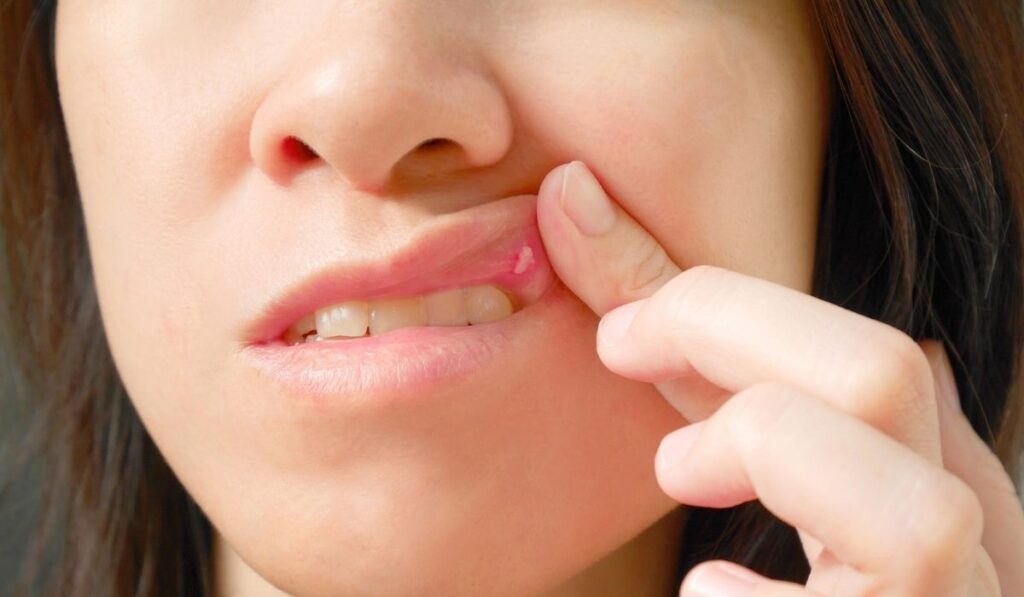Living with braces comes with some unique challenges, but the stunning smile and aesthetic improvements that come at the end of the treatment is worth it. Some ongoing discomfort is to be expected throughout any treatment with braces, and it’s generally manageable. There are, however, a few nastier side effects that can occur — canker sores being one of them.
Canker sores are small ulcers that appear inside of your mouth. They can be a side effect of wearing braces, and typically last a couple weeks after they develop. Pointy edges of the braces can cause scratches and canker sores, but they can be prevented by putting orthodontic wax on this spots.
The good news is that with proper oral hygiene practices and preventive measures, cranker sores caused by braces should heal and go away quickly. Let’s have an in-depth look at what canker sores are, how long they last, what causes them to appear after getting braces, how to treat them, and also how to prevent them from coming back.
What Are Canker Sores?

Canker sores, or aphthous ulcers, are small lesions that occur on the soft tissues inside of your mouth. Oral mucosa or the lining that’s all over the insides of your mouth and the base of your gums are two of the most common places for canker sores to appear.
Canker sores have a round or an oval shape and are a whitish color with a pink border. They look similar to cold sores that occur on and around the surface of your lips, but they’re not contagious.
Canker sores are painful and cause a burning sensation inside of your mouth, which can make eating and speaking difficult.
There are two types of canker sores that can happen due to wearing braces.
- Minor canker sores: These are small and oval-shaped sores that heal on their own within about two weeks.
- Major canker sores: These are larger sores and you can feel that they go deeper into the soft tissue as well. The pain they cause is far more severe than minor canker sores, and they have a rounded shape with large, irregular edges. They can take over a month to heal without treatment, and they can leave a visible scar.
If your braces cause the second type of canker sores, you need to immediately see a physician and see your orthodontist about how best to proceed with the braces treatment.
How Long Do Canker Sores Last?
Most canker sores last from a few days up to a week or two. As long as you’re careful not to further irritate them and maintain good oral hygiene, the sores will go away on their own. If your canker sores are unusually large, cause severe pain or last for longer than two weeks, make an appointment with your doctor immediately.
If they appeared soon after getting your braces, speak to your orthodontist to determine ways to provide relief and care during treatment.
Why Do I Get Canker Sores After Wearing Braces?
Canker sores caused by braces often appear in the first days or weeks after you get your braces. If you have a history of getting canker sores due to irritations even before you get your braces, you are more likely to experience this.
The most common reason for canker sores to happen after an orthodontic procedure such as getting braces is a minor injury to the soft tissue that may have happened either when the braces were fitted or afterward due to the friction from the brackets or wires of the braces.
Since your brain isn’t used to the new items in your mouth, the unintentional movements in your oral cavity can brush the braces against the soft tissue of your mouth, causing canker sores to occur.
Other than the physical friction from braces that directly contributes to irritation of soft tissue, which causes canker sores, there are few other common triggers that increase the risk of getting them.
The initial stress and discomfort you feel when wearing braces can lower your immune response and make it easier for canker sores to form, especially if you’re naturally prone to getting them in the first place.
Another common trigger for getting canker sores after an orthodontic treatment such as braces is eating highly acidic food such as pineapples and lemons, which can trigger canker sores.
How Can I Prevent Getting Canker Sores While Wearing Braces?
Prevention is always better than the cure! Here are several ways you can prevent or reduce the risk of getting canker sores after you start wearing braces.
Rinse Your Mouth With Salt Water
A salt water mouth rinse is a great addition to your daily oral hygiene routine, even if there’s no risk of canker sores. It’s highly cost-effective and convenient since all you need is some warm water and salt, which are two things you always have in your home.
Simply add about half a teaspoon of salt to a warm cup of water and rinse your mouth thoroughly with it. Take time to ensure that you cover the entire surface inside of your mouth with the mild salt water rinse to avoid canker sores from happening anywhere.
Salt consists of sodium chloride, a great compound to inhibit harmful dental bacteria. It also has preventive and healing properties that soothe any minor irritations and prevent canker sores from developing.
Use a Soft-Bristled Toothbrush
Overzealous brushing with toothbrushes that have sharp and hard bristles is a common trigger for canker sores. If your braces make minor irritation on the soft tissue in your mouth, harsh bristles in a toothbrush can further deepen it, and cause canker sores to appear.
Therefore, switch to a toothbrush with soft bristles — like the EasyHonor Soft Toothbrush (on Amazon) — after getting your braces, and hold your toothbrush lightly when you brush. You don’t have to be aggressive when you brush to make sure you get your teeth properly clean.
Avoid Eating Acidic and Spicy Foods
Food and drinks with acidic components such as orange juice, pineapples, tomatoes, and sports drinks can make the inner lining of your mouth more sensitive, which increases the risk of irritation.
The same applies to spicy food since the heat and acidity of such food can irritate the already-tender soft tissue in your mouth. The best thing is to avoid such food starting from at least a few days before you’re supposed to get your braces.
Avoid Toothpaste and Rinses That Contain Sodium Lauryl Sulfate
If you’re prone to getting canker sores often, it is good to avoid teeth cleaning products with sodium lauryl sulfate (SLS) since they’re known to be a trigger for canker sores.
Eat Nutritious Food
While you should always make sure your diet is rich with necessary vitamins and minerals, you need to be particularly mindful about your diet before and during your braces treatment. Eat food with zinc, folate, iron, and vitamin B-12 in particular, since the lack of them can increase the risk of canker sores.
Relax and Reduce Stress
Getting braces and the challenges that come with them can be stressful, especially during the first few weeks. Try your best to relax since emotional stress can negatively affect our immune function, increasing the risk of getting sores and inflammations.
How Can I Treat Canker Sores When Wearing Braces?

The insides of your mouth are feeling irritated and sore, and you can see canker sores are starting to appear. Now what?
Most canker sores that appear after you get your braces go away on their own without the need for special attention. However, the following habits and treatments can help make them heal as fast as possible.
Salt Water Rinse
Rinsing your mouth well with salt water not only prevents canker sores from happening but also helps heal them quickly. Since salt water can be dehydrating, make sure you drink enough water to hydrate the insides of your mouth well after rinsing.
Keep Your Mouth Clean
Dental bacteria can easily cause further irritations and infections when you have canker sores. Therefore, make sure you clean your mouth after every meal and maintain good oral hygiene at all times so your canker sores can heal quickly.
Eat Soft Food
You don’t want to aggravate the sores further with food that’s hard to chew. Stick to simple food that isn’t too hard, acidic, or spicy.
Orthodontic Wax
Speak to your orthodontist about getting orthodontic wax (on Amazon) that will prevent any further irritation with your braces. It’s a soft wax that you can place on your metal brackets and wires to create a soft surface and reduce friction.
Silicon Covers
Similar to orthodontic wax, silicon covers also help protect the inside of your mouth from being irritated by the edges of your braces. You can get these online or at your local drug store. Wear them until your canker sores heal and you become more familiar with having braces in your mouth.
Over-the-Counter Pain Medicine
If the pain and discomfort caused by canker sores are mild but causing disruption to your day-to-day life, you can get an OTC pain medicine until they heal. Our favorite is Kank-A Mouth Pain Liquid (on Amazon).
Most canker sores that occur after getting dental braces go away on their own after a few days. However, due to the pain and discomfort they cause, they are quite annoying! If you’re naturally prone to getting canker sores, inform your orthodontist when you’re getting braces so that they can help you prevent and prepare for it properly.
If your canker sores are particularly painful and last longer than usual after getting your braces, see your orthodontist as soon as possible.


